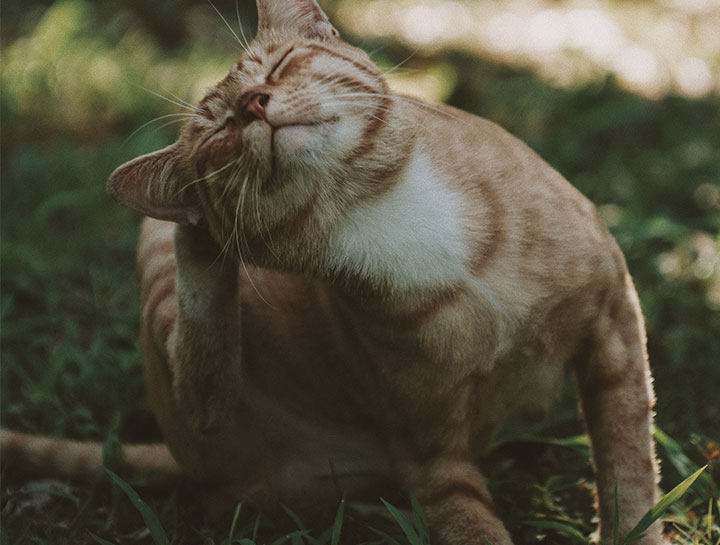“My cat’s fur is dull, greasy, thin, clumping, falling out…why?”

This issue could have many causes: medical, environmental, or even psychological.
There are several hair/coat-related symptoms you might see in a cat having health issues:
- Flaky
- Dandruff along the body
- Red skin/rashes / scabs / inflamed skin and wound-like areas (the cat is scratching a lot)
- If the cat is losing hair, is the cat losing it in clumps or is it generally thinning? Shedding can be normal, especially in the spring and summertime.
- Pay attention if your cat is not grooming as frequently; this can mean they are not feeling well.
Cats can be elusive and it’s often difficult to know when they’re having a problem. One way to stay on top of your pet’s health is to brush your cat regularly so you can familiarize yourself with your companion’s hair and skin. That way, you’ll know when something is “off” or abnormal.

What are the most common health issues you see that cause hair and coat problems in cats?
Parasites and allergies are really the #1 cause. While Colorado is lucky in that our climate is dry and fleas aren’t as severe here, they do exist. Along with mites and lice, these parasites can give your cat an allergic reaction that results in hair loss, itchiness around the head and neck, and inflamed skin. Bacterial and fungal infections are also frequent in cats with allergies.
The second most common issue involving poor skin and coat is when a cat has dry, flaky, or oily skin. Usually, a feline with these problems isn’t grooming itself because it is not feeling well. The cause could be an internal systemic illness, such as:
- kidney disease
- thyroid issues
- liver disease
- autoimmune problems
- cancer
Cats will often also lick an area that is in pain, causing hair loss or a skin lesion. They may lick at a sore joint, or even their belly as a sign of a bladder infection.
What are the psychological issues that could cause a cat to have hair and skin problems?
Licking and hair loss may be due to stress—has there been a change in the home, such as relocation or the addition of a new pet? Cats can be extremely sensitive to alterations in their surroundings.
These symptoms can also be a sign of obsessive-compulsive disorder (OCD). Many times, OCD is diagnosed through a process of elimination. If nothing else is going on that could cause your pet to be stressed, OCD may be the culprit.
What are the treatments for making my cat more comfortable and resolving my cat’s skin and coat problems?
Obviously, treating the underlying condition and making your cat more comfortable is a priority for us and for you. Depending on the cause of the issue, treatments can include:
- Bathing with medicated shampoos and/or conditioners
- Eliminating parasites on the pet and in the home
- Using anti-inflammatory or antimicrobial medications to resolve bacterial and yeast infections
- E-collars and cones to prevent licking and speed recovery
- Starting a hypoallergenic diet or medications for allergies
Please talk to your CCAC veterinarian before you use any product on your cat—some cleansing products have ingredients that may be toxic to your pet.
Good nutrition is your cat’s first line of defense against skin and coat issues!
A well-balanced diet is the first line of defense for your pet when it comes to overall health as well as coat and skin problems.
All the vets at Cherished Companions Animal Clinic believe that one of the most important nutrients for your cat’s skin is omega-3 fatty acids. They are the building blocks for healthy skin and hair, and you can easily add an omega-3 supplement to your cat’s diet.
The good news is that, regardless of the reason behind the untidy appearance of your cat’s coat, there are solutions that we can work through together so that you can get back to doing what you really want to do: snuggling with your furry friend.
